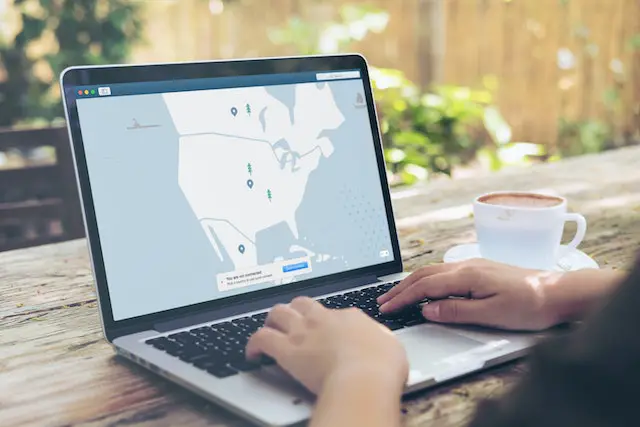The use of virtual private networks (VPNs) has skyrocketed in recent times, with this trend particularly prevalent among younger citizens.
More specifically, approximately 39% of all VPN users in the US and UK are aged between 16 and 22, with this demographic largely using such networks to circumnavigate streaming restrictions while traveling.

In short, VPNs afford you preferential access to streaming services and other restricted content from anywhere in the world. But how exactly do they work, and what factors do you need to consider before completing a VPN download?
How Do VPNs Work?
Interestingly, VPNs were initially created for business use, but it wasn’t long before consumer iterations began to hit the market across the globe. These were designed to meet a range of different challenges, from providing more robust levels of network security and breaking down geographical content restrictions.
But how do VPNs work in general terms? Well, they effectively create a virtual tunnel that’s encrypted between your device and connected server, ensuring that all data and web traffic that travels between these two points appears as an indecipherable string of code.
This prevents hackers, network managers, and even Internet Service Providers (ISPs) from intercepting your data and viewing your online activity, creating a much-needed layer of protection on unsecured public networks that are often targeted by nefarious individuals.
Because VPNs can also connect your device to remote servers across the globe, you can also mask your IP address and physical location.
This means that you can effectively trick service providers into thinking that you’re located in a particular country, in order to access specific content libraries and negate the impact of licensing terms and conditions. Due to having the ability to fake the location by masking the original IP address, I have used a VPN for quite some time and I can say that you will get the actual freedom of accessing the content from worldwide. For example, a website is blocked in my country, India, but is not blocked in the US. So, what I will do is, I will connect to the internet using a US VPN server which will pretend that I am connecting from the US, and thus, I will be able to access that website. You can also use proxy servers for this, but VPNs are safer and more professional to use. Many tech freaks compare VPNs and Proxy Servers before they choose either of them for their requirements.
What to Look for in VPN Providers?
Both of these considerations are key from the perspective of travellers, who often access unsecured networks at hotels and cafes while on the move.
Similarly, they may want to access the Netflix library accessible in their country of origin (such as the US or UK), and deploying a private VPN client is the only reliable way of achieving this objective.
But what factors should you consider when choosing a VPN client, and how can you realize the full potential of this technology? Let’s get into it!
- #1. Can You Find a Compatible VPN?: Before you download a VPN, it’s important to ensure that the client is compatible with your device. So, you’ll need to download VPN software that’s designed for or compatible with a particular operating system, whether you own an iOS, Android, Mac, or Windows device.
- #2. Do You Need a Paid VPN?: Typically, paid VPNs offer a wider range of features and superior coverage than free alternatives, while the latter may also leverage your data and web traffic to generate an income stream. This may compromise your privacy and partially negate the reason for deploying a VPN in the first place.
I have used a free VPN for normal work like accessing a few websites for information purposes, and it did work out well. But, when you need to stream video content, free VPN sucks because the servers you use to connect are very slow. In that case, you must need paid VPN.
One more thing that may happen is the free VPN services may have DNS Leak issue which means your connection is not fully encrypted and your identity may leak. I have tested it once, and I found some free VPN connections may leak your identity. However, since I don’t need any professional needs, I go with free VPNs as I don’t have any intention to hide my IP. I just need to access some normal sites to get some information that doesn’t open in my region. - #3. Does Your VPN Feature a Large Number of Server Locations?: If you want to access particular Netflix libraries or other restricted content while traveling, you’ll need to ensure that you select a client with as many server locations as possible. This ensures a dense network of coverage and allows you to connect to remote servers in relevant locations.
- #4. Does it Offer a Free Trial?: Ideally, your VPN should be easy to install and use, but it can be hard to gauge the navigability of specific clients when comparing the market. So, check to see whether the VPN client in question offers a free trial to users, as this enables you to see precisely what it has to offer and make a more informed decision.
- #5. What Protocols Does it Use?: All VPNs use protocols, which describe a set of rules that determine how data will be packaged and sent over a private network. However, not all protocols are created equal, with OpenVPN and WireGuard among the best in terms of speed and security. VPN clients tend to use different combinations of protocols, so check these out to ensure that you select the right option for you.
- #6 Is it Affordable? When I used the VPN software, I did check the affordability thing as a factor as well because many VPNs like ExpressVPN and a few others are very costly and not everyone can afford them. So, when you check out the VPNs, do check the price as well. Because similar types of servers you can get from good VPN companies at lower costs as well. It needs a bit of research.
The Bottom Line
There’s no doubt that VPNs offer genuine appeal to travelers, particularly those who regularly use unsecured public networks and Wi-Fi hotspots while on the move.
Similarly, VPNs are capable of masking your device’s IP address, enabling you to negate content, streaming, and licensing restrictions as you travel from one location to another.
However, the key is to choose the right VPN to suit your needs, while appraising a client’s range of server locations and use of protocols. Generally speaking, you should also prioritize paid VPNs over free clients, which have only basic security and privacy features and may monetize your data in some instances.
By choosing the right VPN, you can optimize your traveling experience while optimizing security and your privacy at all times.







Add Comment